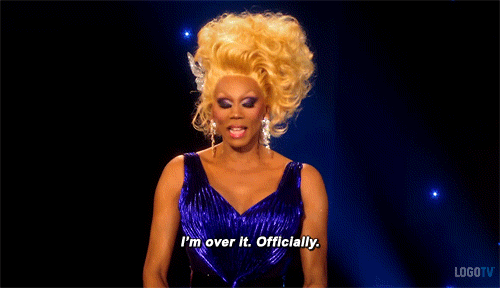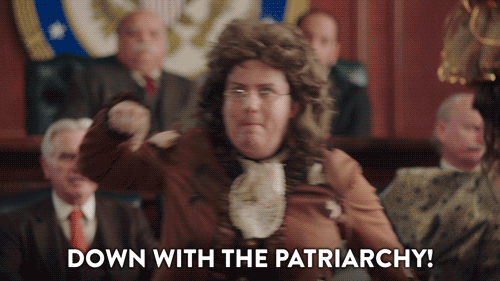No.
Oxford English Dictionary defines persistence as the following: “Firm or obstinate continuance in a course of action in spite of difficulty or opposition.” Persistent people go far in life, don’t give up, ultimately get what they want. Sounds pretty fool-proof, the method of not stopping until your desired outcome is achieved.
When applied to tackling a project or screwing the lid off a salsa jar, persistence can be pretty valuable. But it can also be a deeply-rooted microaggression, a sneaky way patriarchal behavior weaves its way into everyday life.
A lot of the discourse around consent focuses on sexual assault, which is valuable and important. An estimated 1 in 6 women in the United States is a survivor of completed or attempted rape, a statistic that is likely an underestimate due to the exclusion of trans individuals and unreported cases. Rape is such a violent, intrusive act: it’s easy to target the conversation of consent to the most extreme end of the spectrum.
And we do recognize sexual harassment in our culture. Have you watched the clip of Trump suggesting he could “grab women by the pussy?” Seen the movie Bombshell? Been catcalled at the airport or ketchup dispenser? Had a man persistently beg you on a dating app to come over to his apartment? I can say yes to all of the above, and I imagine many of you did, too. We as a society understand what harassment is and, on some level, get that it’s not okay when it comes to sex.
But consent goes beyond the bedroom or suggestions thereof. And there is far more work we all must do to unpack the times where “no” is mistaken for “convince me.” Sex aside, I have been in so many situations where I have clearly laid out my boundaries to a cis man and he has blatantly ignored them. Why? Because men — especially cishet white men — still have more power in our society. And they can abuse it as they please.
Last summer, I was chatting with this guy I met on Hinge for about two weeks. When we did hang in real life, he went in for an on-the-lips kiss straightaway and refused to let me split the bill with him for dinner, claiming we would “make up for it next time.” We had previously discussed going out for ice cream, but I needed to deal with some work, which I told him outright, but he begged. I walked quickly to the subway, yet he kept reaching out for my arm or hand, even when I brushed him away. When I got home, I thanked him for dinner but expressed that I wasn’t interested in dating him, then blocked his number because I was so uncomfortable.
Less than a week later, a close male friend and I went out together. We grabbed drinks and snapped a cute selfie at sunset, which I posted on my Instagram story. While we were waiting for our table at dinner about an hour after, my friend got a message on Facebook from someone he didn’t know.
I looked on Instagram and saw that the guy I had gone on one date with — who didn’t follow me, by the way — had viewed my story a few minutes prior to my friend receiving this message. We put two and two together pretty quickly.
Let me break it down for you: my friend and I are not dating, and nothing on either of our social media profiles gives any indication as such. So this man not only made a grand assumption, but also took the time and effort to make a fake Facebook account, track down my friend — who I had never mentioned in our two week correspondence — and send a message designed to throw me under the bus, making him look like some kind of martyr for catching a cheater in the act.
So, was this sexual assault or harassment? No, but this behavior was cut from a similar cloth, one that tells cishet white men that they can do whatever they please to get what they want. Just one of the many fun ways in which the patriarchy still oppresses womxn, even privileged white womxn like myself.
Oh, and one final point: this man was 28, about to be 29. I was 21. No, it does not get better with age; in fact, in many ways, it gets worse, because age dynamics just give men even more power.
Another time, I was texting with a guy for a couple of days, but found the conversation starting to fizzle. For the next six months, he continued to text me, even though I didn’t respond a single time. When I blocked his number, he DM’d me on Instagram. When I blocked his Instagram, he messaged me on Facebook. When I blocked him on Facebook, he pinged me on WhatsApp. WhatsApp!!! I never even met the guy, and here he was, thinking he was so entitled to keep reaching out an alarming frequency.
Was it sexual assault or harassment? Definitely not. Each time he would message me, it would be to wish me a happy holiday, just saying hey, or, ironically, “Sorry to be a bother.” Was it scary or life-threatening? No, not really. But was it annoying and inappropriate? Absolutely. Boundaries were clearly drawn and he had the privilege to ignore them without any fear of consequence.
A few months later, I was texting with a different guy for a couple of days, but was really busy with work and knew I’d be occupied with friends and family with the holidays fast approaching. He kept reaching out, so I told him nicely that I didn’t have time and didn’t want him to wait around to meet me in person, both of which were true.
Was his response horrible? No: he had the right to be honest, just as I did, and maybe I should have told him outright that I wasn’t interested. But still, he not only called out my truth for being “weird” — I don’t think being too busy to date is a “weird” reason at all — but also got defensive about me rejecting him. If I had gotten a message like the one I had sent to him, I would have replied something like, “No worries, I totally understand, thanks for letting me know!,” because we should be respectful of one another’s time or lack thereof. If it was someone I really wanted to meet, I may have said, “Okay, if you ever have time I’d love to grab coffee!” but left it at that.
Again, none of this was outright violent or oppressive, and in fact, I’m sure these dudes were oblivious to what they were doing. But regardless, their behavior demonstrated that they believed if they could simply convince or provoke me — whether through throwing me under the bus, texting me non-stop for months, or questioning my logic — they would get my attention. Did no one teach these men that that’s not how it works?
You’d think I’d get away from this nonsense in quarantine. NOPE. I wound up having a two week-long thing online with someone, which wound up being a dumpster fire. I quickly recognized some major red flags and made my ungraceful exit. Did I handle it perfectly? No. Did I do the best I could as a 21 year-old trying to let down a much older man? Yes, I think so.
I told him over the phone that I needed to stop we were doing. Afterward, I sent a lengthy email that explained why I could not continue. He responded, and I briefly followed up, stating that I would be cutting off communication going forward and asked him to do the same. In the two weeks that followed, he sent me at least 5 or 6 emails begging me to speak with him on the phone. In these messages, he’d gaslight and criticize me, demanding me to acknowledge him, calling me mean and cruel for ignoring him, even though I had explicitly drawn a boundary.
Listen, I got myself into a sticky situation, so I too am at fault here. Perhaps I could have been clearer in my initial phone call. But I did the best I could with the mental state I was in and gave him plenty of explanation. He was in an immense position of power over me as a much older man and I was scared. What more could I have done while also keeping myself safe?
All of this is to say that beyond sexual assault and harassment, men still find ways to disregard boundaries and disrespect consent. Yes, we’re all guilty of this, regardless of gender, but cis white men (the subjects of all of the aforementioned examples) do this more often and have an easier time doing so because of the inherent power and privilege the patriarchy gives them. If womxn pursued men with such intensity, we’d call them clingy, needy, desperate; when a man does this, we let it slide because they’re just “shooting their shot,” right?
So, what can all of us do to perpetuate the message “no does not mean convince me” into contexts beyond sex?
For one, we as a society need to practice honest communication more often. Especially among young people, it’s seen as appropriate to be “chill” when talking to others, keeping intentions fuzzy so as not to make anything too serious or complicated. In reality, this approach makes things more confusing, because when there isn’t clarity, it’s more difficult to draw boundaries. Instead of resorting to “soft” behaviors — ghosting or making up nice excuses — we need to be firm with one another. Firm does not mean be a jerk: be honest, but have that truth come from a place of compassion rather than tearing the other person down in the process.
Was I honest here? Absolutely. I had a lot going on and wasn’t interested in dating. Was I kind? Definitely. I gave him a compliment, expressed not wanting to waste his time (because I valued it), and wished him well. But was I firm? You bet. I didn’t leave gaps for him to question anything and didn’t answer his response. I stuck to my word and he stuck to his, no bad feelings on either side.
Regardless of gender, we all have to check our persistence. If someone doesn’t respond to you, follow up once or twice in a brief, non-threatening manner, but then leave them be. Make sure you give the other party ample time to respond before “double or triple texting,” as we spring chickens call it. If they wanted to reply, they’d find a way to do so. Relinquish your control and leave the ball in their court. Ghosting isn’t nice, but it’s also not nice to repeatedly question someone’s decision.
In relationships, I suggest having check-ins with one another, no matter how casual or serious something is. Look at moments of contention as discussions rather than arguments. An argument implies a certain level of violence — it’s me against you, we’re fighting, and there’s going to be a winner and loser — all of which strikes me as unkind and patriarchal. In a discussion, on the other hand, both people approach a situation with their own information and opinions, and hopefully reach a better understanding of one another at the end. Just as we should ask, “Is this okay?” when sexually-engaging with someone, so too should we request consent in day-to-day treatment.
Is it the sexiest thing in the world? No. But is it crucial in building a healthy, sustainable relationship or friendship? Absolutely. The more you know, the more you can respect the other person and their boundaries. Talk about how much time you’d like to spend with one another, the frequency at which you’d like to communicate, how you respond to situations when you’re mad, sad, or glad. Be open and take your time. Persistence has a certain immediacy to it — you need to answer me NOW, pay attention to me NOW, see me NOW — and that kind of pressure isn’t very kind. Sometimes, it’s warranted when there’s a deadline at the office or we’re genuinely concerned for someone’s safety, but usually, we can pause and give others space to breathe.
To all of the cishet white men (and men in general) out there reading this: I know you probably hear it a lot, but please, check your privilege. Unfortunately for us womxn, you implicitly have more power in most cases: be aware of that fact. If you’re confused about a womxn’s intentions or behaviors (or anyone’s, for that matter), ask in a direct but non-defensive manner. Take mixed signals as a no. And if womxn tell you that they aren’t interested, don’t have time, or stop responding to you, respect their boundaries. Pay attention to not just each other’s words, but also body language, tone, and mood. (This is why communicating online sucks!) If someone appears uncomfortable, they probably are. And if you don’t know, ask. Remember that honest communication we discussed!
All of this talking and asking for permission may seem silly, but at least for me, I’d rather live in a society where we are extra careful than oblivious and disrespectful. If we (especially cis men) were simply more thoughtful about choosing words and behaviors, perhaps we wouldn’t need to be so rigid. Until then, I believe we should all be more courteous toward and conscientious of one another and our respective boundaries. But maybe that’s just the chatty Gemini in me.












